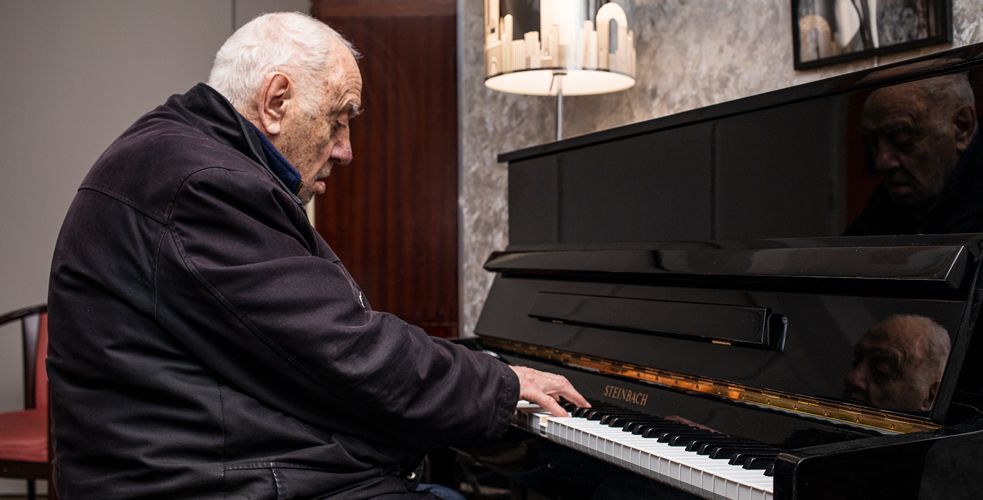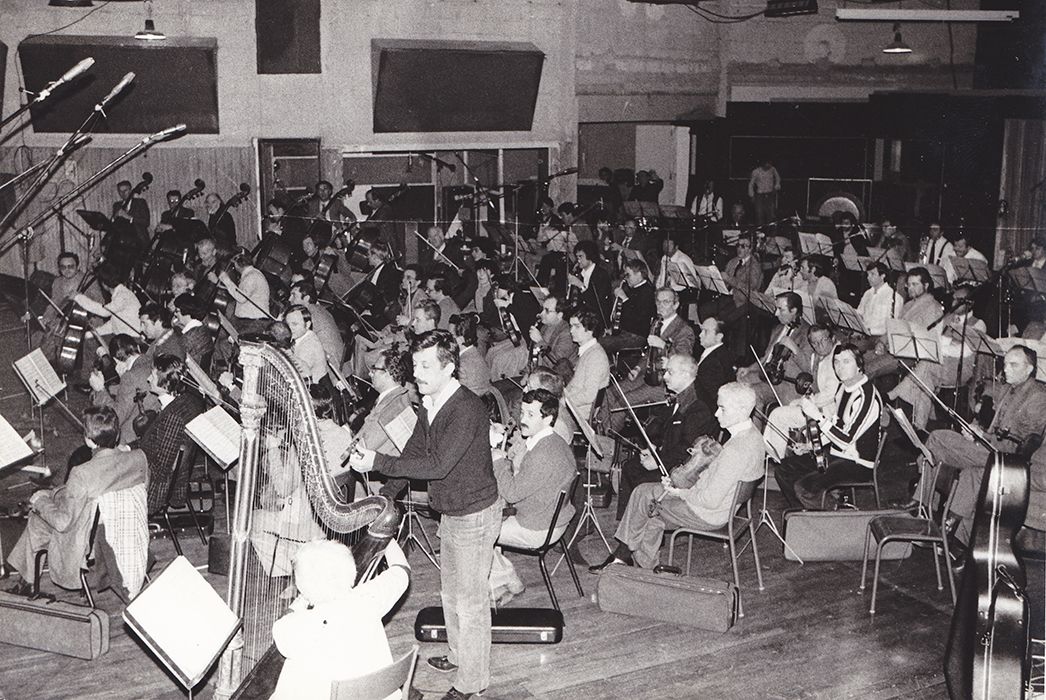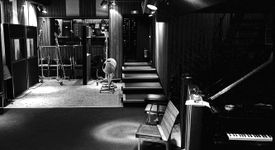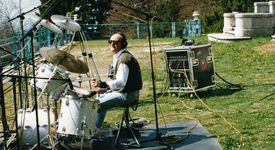Yves Chamberland, founder of Studio Davout, is dead (and no longer playing the piano)

Yves Chamberland, founder and director of France's most famous recording studios, Studio Davout and Château d'Hérouville, passed away this week. Manuel Jacquinet was lucky enough to meet him in 2020. Here follows their conversation.

Four years ago, one of the biggest and most famous recording studios in the world closed in France. It was called the Studio Davout. A school was to be built on the site of the former cinema, which had been transformed into a mythical studio. The following photo shows that the school is not yet fully open, so we went to ask the founder, still alive: Yves Chamberland.
The last of the great mohicans, a French genius of sound, a man who created one of the greatest studios in the world, where thousands of records and famous film scores were recorded, is still alive. His name is Yves Chamberland and, according to those who knew him well, he’s still his grumpy self. We went to meet the founder of the Davout studio who now lives in a small retirement home in the 15th arrondissement in Paris.
(Update of January 2022: Yves Chamberland has moved to a DomusVi retirement home, Paris 13. He says it’s more comfortable and welcoming.)
Manuel Jacquinet: So, what do you do all day and why do you live in this retirement home?
Yves Chamberland: I'm bored. There's nothing to do here and the restaurant is expensive. It’s 25 to 30 euros for starters and desserts, and the food’s not even very good. So I go out to do my shopping and from time to time, during the holidays, I go to see old friends or sound engineers. But that was all before this virus. I live here because one day I convinced myself it was the right solution. Now, all my stuff is here and I've left the flat I was living in. I sold my last car.
Do you remember what led you to create Davout?
I wanted to work at home, in a studio that was my own, and in accordance with what the clients, the groups, asked for. But, truth be told, I don't remember everything very well. I remember that we had up to four big studios and that the greatest sound engineers came and worked there. How long are you going to film me with this thing? (nb: we took notes and filmed with a smartphone).
Before creating Davout, you worked at Europa Sonor and in other studios. At the time, you often went to the United States to find the right equipment, to identify what could make the difference. Where did this passion come from?
I don't remember too well, it's a long time ago. So you did a book on studios?
He flips through the book, looking at the pictures, some of which he stops at, to scrutinize with his mischievous, piercing eyes. At the vending machine, he asks for a sweet coffee, very sweet, and we conclude the interview in the basement, so far from Boulevard Davout.
Yves Chamberland: The basement is big and there's never anyone here. I used to be a jazz drummer, but I can't play anymore. In fact, I've recorded a lot of jazz. I even have tape recordings of a Michel Petrucciani concert. One day, I'm going to get them out out and make a record, but I don't have the time to do it.
Yves Chamberland takes off his hat, sits down at the piano and plays some melodies, four years after the definitive closure of the Davout Studios. (Video.)
Like Château d'Hérouville, Davout studio was one of the first great legendary studios in France. Established in 1965, it was definitively closed in April 2017, because the City of Paris wanted to recover the premises to build a school (which has still not been built). Initially founded by Yves Chamberland, a musician and sound engineer, he was soon joined by Claude Ermelin and under their direction, Davout put France among the very great nations in the world of recording. Many film scores were recorded there, but not only: Maxime le Forestier, Prince, Talking Heads and The Rolling Stones all came through the doors.
Here follows an article written by Pierre Lafitan for Guitare Magazine in 1983 and extracted from the book « Legendary Studios - Secrets and Stories of our French Abbey Road » by Manuel Jacquinet (Malpaso RCM editions, 2020).
Davout, the old grumbler
No great studio comes without a great boss, visionary and characterful, who some would say was « assertive ». By rereading this fascinating article dating from 1983, we can better understand that Davout, just like Ferber or Gang, are not just places equipped with a console. There are owners with visions and convictions, such as Yves Chamberland.
By Pierre Lafitan, Guitare Magazine, 1983.
If you don't go to Davout, Davout will come to you. Although he has no Gascon roots, Yves Chamberland cultivates this maxim with real happiness. Not content with welcoming artists to his home, he goes out to meet them, thanks to the mobile studio. And not just any artists. In bulk: Croisille, Salvador, Perret, Cordy, Trénet, Roussos, Mathieu, Simon, Souchon, Ribeiro, Béart, Bécaud, Prucnal; plus the tenors of classical music and the crazy ones of jazz.
Chamberland has no musical preconceptions. Everything that is good and rare is dear to him. His pride and joy is to make high-performance equipment available to the big names in show business. For he is first and foremost a technician. With a diploma in higher maths and a "radio and radar" diploma from the army, he built consoles, microphones and amplifiers when he was young, using spare parts he found in American surplus stores. Later, he built four or five studios, including the first Salle Wagram (in 1958), before teaming up with Jean-Michel Pou-Dubois in 1962 at Europa Sonor. This studio, set up on rue Charcot in a sort of patronage room that hardly looked the part, offered his stunned clientele a three-track, no less! The first French 3-track. Yves Chamberland reigned over the buttons, visibly happy. Two years later, however, he quit and, in 1965, founded the Davout studio in a disused cinema on the boulevard of the same name. Davout started with 3 tracks, then quickly increased to 4 tracks, then 6, 8, 16 (in 1972) and 24 (in 1974). The sound qualities of the Davout studio, which was clear and very spacious (300 square metres), attracted the great classical groups and stars of the moment. With the help of success, the business expanded. A second studio B (much smaller than A) was built, followed by a studio C (of medium size).
Later, a fourth studio was set up for mixing
Not only the technique, but also the people count for a lot. Right from the start, Yves Chamberland called his assistant from Europa Sonor, Claude Ermelin, to his side, and he became the head sound engineer. Today he is the director of Davout, responsible in particular for planning (Yves Chamberland is CEO). But Ermelin remains first and foremost a sound engineer. As one of the best in the business, he is assisted by Roger Roche, Philippe Omnès, Daniel Abraham, and three assistants: Loïc, Fabrice and Jean-Loup.
With its four studios, Davout benefits from a homogeneous group, who are very competitive on the technical level. But Yves Chamberland is not a man to be complacent. He is therefore preparing to renew his equipment. As a first step, Studio A was equipped last spring with an automatic MCI console. Studios B and C will soon be equipped with an analogue 32-track. Why not, while we're at it, a digital one? But no, Chamberland isn't interested at all. He doesn't seem convinced by digital recording.
« It’s not that I reject technological innovations, quite the contrary. But I consider, and Ermelin agrees with me on this point, that the digital system has not yet fully proved itself. It is not a radical improvement on the analogue system. I defy anyone to hear the difference between an analogue and a digital recording. And then there are too many maintenance problems with digital. The machines can go wrong at the drop of a hat and are very sensitive to weather variations. Not to mention their price, which is absurd and prohibitive. At the moment, the only way to get digital equipment is to lease it. That will cost more than 20,000 francs a month. No thanks, I want to sleep at night. Between us, for the moment, digital is a matter of trade and snobbery. When the machines have evolved, we'll see. »
If we understand Chamberland well, digital sound is a sanitized sound, very clean, certainly, without breath, but also without soul. But the Davout boss likes a warm sound, even if it comes from a machine that doesn't look good. Proof of this is the installation of his mobile truck, known as "la poubelle", with which he makes recordings on stage (Macias, Hervé Villard, Salvador), and sound recordings during TV shoots ("in television, sound is the poor relation"). The « trash-can » is not very sophisticated: an honest console, with small Baxendall correctors, no microphone preamp, but what an output!
The same efficiency for the cinema activity of Davout
Cinema and Davout have been good friends for many years. For this purpose, the studio has a 35 mm 6-track and a 24-track synchronized on the image. The aim is to mix either for a possible film music record or for the cinema, using the multitrack on which we record. [...] "Established" stars, traditional songs, classical music, jazz, stage recordings, television, cinema... that's a lot of work. But Chamberland doesn't want to stop there. He has an image problem, it seems. He doesn't want Davout to be seen as a cushy studio, giving everything in the Mireille Mathieu or Annie Cordy niche. His goal now is to attack the young clientele and, to do this, to attract rock bands to his studio A.
"Currently, in the United States, rock bands are looking for spacious studios like ours, with this very 'live' acoustic due to the space. Because space is a precious asset. I hope that French bands will understand that Davout A is an ideal working tool for them. In any case, the Americans welcome this "Davout A". They recently awarded it a first prize for its exceptional acoustics and performance. So when will the electric guitars come rushing into Davout? »

Legendary Studios - secrets and stories of our French Abbey Road
Beautiful book (written in French) enriched with exclusive photos. 352 pages. Weight: 1,3kg!
Published by Malpaso-Radio Caroline Média.
45 euros (+ 10 € FdP France Métropolitaine)
Order it here !






